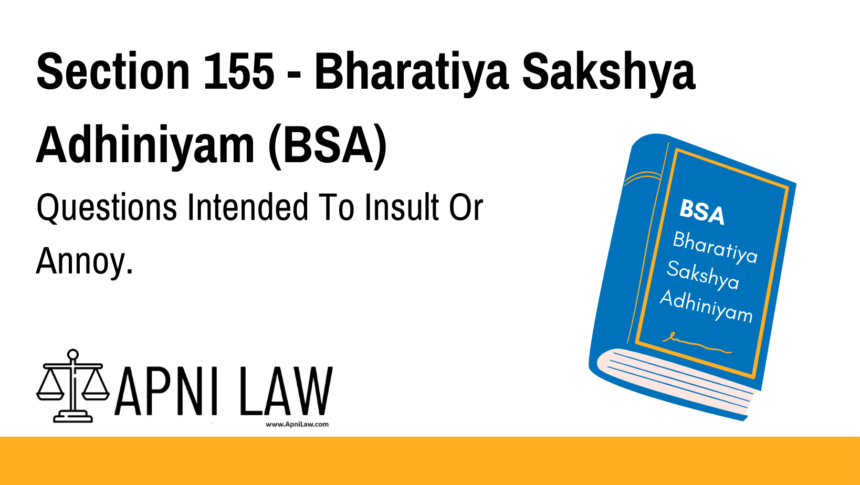Code: Section 155 – Bharatiya Sakshya Adhiniyam (BSA)
The Court shall forbid any question which appears to it to be intended to insult
or annoy, or which, though proper in itself, appears to the Court needlessly offensive in
form.
—
Explanation of Section 155 BSA
Section 155 of the Bharatiya Sakshya Adhiniyam protects the dignity of individuals during legal proceedings. It empowers the Court to stop any question that seems meant to insult or annoy a witness or party. Even if a question is technically allowed, the Court can disallow it if it is unnecessarily harsh or offensive in its wording.
This section ensures that cross-examinations remain respectful and free from personal attacks. It is particularly relevant when a question, although relevant to the case, is phrased in a way that humiliates or agitates the witness.
By enforcing this rule, the Court ensures that the legal process remains fair, focused, and humane.
—
Illustration
Here is an example to show how Section 155 works in practice:
Example:
During cross-examination in a theft case, an advocate repeatedly asks a witness aggressive and sarcastic questions about their background, aiming to provoke or embarrass them. Although some of the questions may relate to the witness’s credibility, their tone and phrasing appear intentionally insulting.
The Court may intervene and forbid further questioning of that nature under Section 155, even if the line of inquiry could have been valid if asked respectfully.
—
Common Questions and Answers on Section 155 BSA
1. What kinds of questions are covered under Section 155?
Section 155 covers any question that seems intended to insult, provoke, harass, or belittle a witness, regardless of its relevance to the case.
2. Can a relevant question be forbidden under this section?
Yes. If the question is framed in a way that is offensive, sarcastic, or intentionally hurtful, the Court can forbid it—even if it relates to the case.
3. Who decides whether a question is insulting or annoying?
The judge has the discretion to decide. The Court evaluates the tone, context, and phrasing of the question to determine whether it crosses the line.
4. Is this section meant only to protect witnesses?
Primarily, yes. It aims to protect witnesses from hostile or aggressive questioning. However, it also helps maintain overall courtroom discipline and professionalism.
5. How does this relate to Section 154?
While Section 154 deals with indecent or scandalous questions, Section 155 focuses on questions that may be personally offensive or designed to irritate. Both sections ensure that questioning remains respectful.
—
Conclusion
Section 155 of the Bharatiya Sakshya Adhiniyam plays a vital role in promoting civility and fairness in legal proceedings. It gives the Court the authority to prevent questions that cross the line into personal attack or insult. By doing so, it upholds the dignity of witnesses and ensures that the courtroom remains a place of justice—not humiliation.
For more simplified legal explanations and updates, explore the ApniLaw legal knowledge base.








